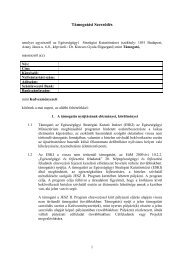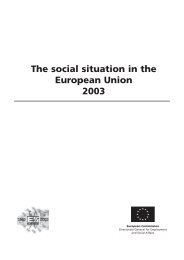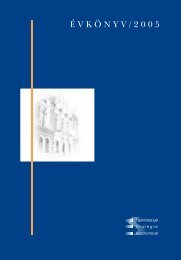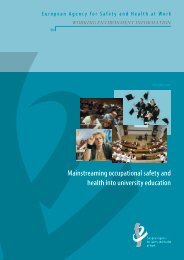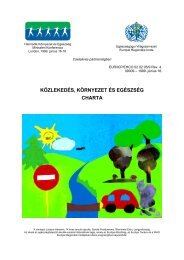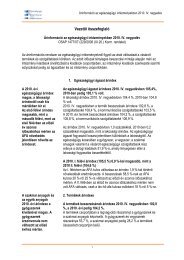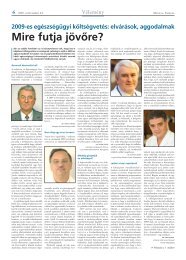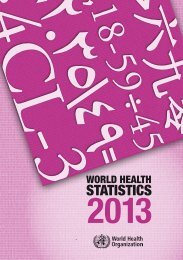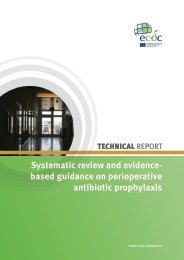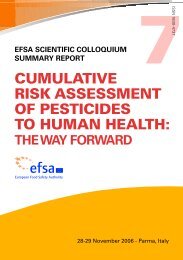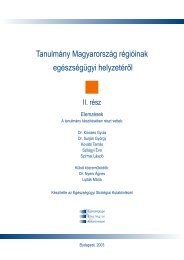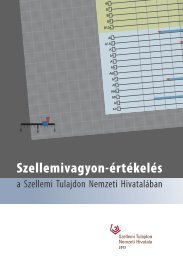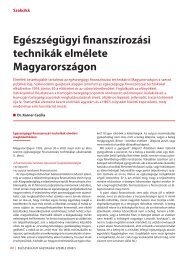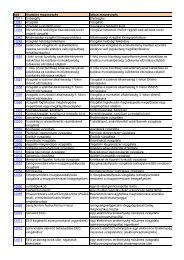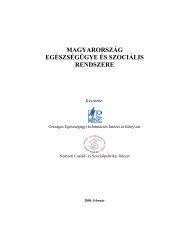WHO Technical Report Series, No. 981 - World Health Organization
WHO Technical Report Series, No. 981 - World Health Organization
WHO Technical Report Series, No. 981 - World Health Organization
You also want an ePaper? Increase the reach of your titles
YUMPU automatically turns print PDFs into web optimized ePapers that Google loves.
4. Quality control – International Reference<br />
Materials (International Chemical Reference<br />
Substances and Infrared Reference Spectra)<br />
4.1 Update on International Chemical Reference Substances<br />
4.1.1 Overview<br />
International Chemical Reference Substances (ICRS) are reference substances that<br />
are used as primary standards in physical and chemical tests that are described<br />
in The International Pharmacopoeia, and for establishing official secondary<br />
standards. The standards are officially adopted by the Expert Committee.<br />
<strong>WHO</strong> <strong>Technical</strong> <strong>Report</strong> <strong>Series</strong>, <strong>No</strong>. <strong>981</strong>, 2013<br />
14<br />
4.1.2 <strong>Report</strong> on activities of the host organization related to<br />
International Chemical Reference Substances<br />
In 2010 the European Directorate for the Quality of Medicines & <strong>Health</strong>Care<br />
(EDQM) of the Council of Europe took over responsibility for establishing,<br />
preparing, storing and distributing <strong>WHO</strong> ICRS. The Expert Committee received<br />
a report from EDQM regarding this work, as of 31 March 2012. EDQM reported<br />
that initial challenges in taking over existing stock of ICRS from Apoteket, which<br />
was a former <strong>WHO</strong> collaborating centre responsible for the distribution of the<br />
ICRS, had now been overcome. A good and productive working relationship<br />
between EDQM and the staff of The International Pharmacopoeia was reported.<br />
In 2011, EDQM distributed a total of 876 ICRS, with 61% of the total<br />
number of items being sold within the <strong>WHO</strong> European Region. Eight studies<br />
to establish new ICRS were carried out, and five new ICRS were provisionally<br />
adopted or proposed for adoption. One study was performed to establish a new<br />
International Infrared Reference Spectrum (IIRS) for proguanyl hydrochloride.<br />
Monitoring for continued fitness for purpose was carried out on 19 ICRS.<br />
EDQM noted the importance of verifying the feasibility and availability<br />
of the envisaged International Chemical Reference Substance as the monograph<br />
is being established. Further, it was pointed out that information in terms of<br />
chemical composition and structure of the impurities intended to become ICRS<br />
should be systematically included in The International Pharmacopoeia.<br />
The Expert Committee thanked EDQM for its work and took note of<br />
the report.<br />
The secretariat informed the Expert Committee that EDQM announced<br />
in 2012 that it could not carry out any production of ICRS involving compounding<br />
of different materials into one ICRS. In addition, EDQM stated that it was<br />
not in a position to establish ICRS that are not mentioned in The International<br />
Pharmacopoeia, although they may be mentioned in other <strong>WHO</strong> quality assurance<br />
documents.



